|
| Dexys Midnight Runners
Everett True with an in-depth interview with Kevin Rowland and Kevin Archer. |
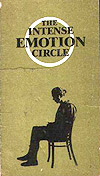
| What have you been doing?
KR: "I've been taking it easy."
KA: "I've been taking it easy on the train down from Birmingham. I moved to Germany for two years, moved back, that's all. I was trying for a record deal over there, in Hamburg."
Motivation.
KA: "Success. At the time we came out, there were many groups who were unsuccessful who lasted about 10 months, a year, didn't achieve anything."
KR: "Which ones?
KA: "It was a sub-culture of Birmingham, everyone was low achievers. We said that as least we'd be successful."
KR: "I felt that somewhere inside me that I could do it, I could be in a group and I could be great. It had been my childhood dream and I'd abandoned it over the years. I felt not very good about myself, and I felt a desperation to do something, to prove myself. It was kind of late, as well. I must have been 26. These days, that's young - but back then it was really old."
KA: "I was in a group before, with Pete Williams. We wanted it to be a serious group, but it wasn't - and it was old-fashioned. We wanted to be successful, that was the main thing. When I met Kevin, he was more realistic. I could see it happening. I got a positive feeling from him. I knew we'd be successful because the whole thing was a good idea. Kevin's brother came to a pub where I was practising with a group, and Kevin liked one or two of the songs..."
KR: "Who did?"
KA: "You did."
KR: "Did I?"
KA: "Yeah. I can't remember now exactly."
KR: "My brother was looking for groups to manage."
KA: "So Kevin came along, and we got chatting. Then I got a call a few months later, wasn't it?"
KR: "Quite a few months later, yeah."
KA: "A few months later."
KR: "From me?"
KA: "Yeah. Would I like to join The Killjoys? The group Kevin was in. They were doing like a 50s thing at the time, they'd gone past the punk thing. It was very difficult to get into it..."
KR: "Into it?"
KA: "Yeah. Because it was quite popular around Birmingham and that."
KR: "What to be in the band? To be a member of it?"
KA: "Yeah, I thought so."
KR: "What, it was hard for you coming in?"
KA: "Not coming in, but to get in. I was highly honoured to be asked. I enjoyed it, the time I was with it. A few months later, we split up over musical differences. Kevin said he had an idea for a group, would I like to join? I said I'd think about it. I thought about it, and I said yes." |
|
| What did he say his idea was?
KA: "To form a soul group with a brass section and all looking good. That appealed to me. At the time, everyone was looking the same. It was a bit post-punk. Everyone used to wear punky kind of clothes, black. That was it. That's how it started. There were only two of us at the start, and we had loads of people who didn't fit and we just argued. And then we arrived at the line-up."
What groups were you looking to for inspiration?
KR: "Where we looking at any?"
KA: "Sixties soul groups. That was the listening."
KR: "I hadn't thought of any. No groups. There was maybe a bit of Roxy Music - for the look. We knew we wanted to be a group that would look like something. We wanted to be a formed group, a project not just random. We weren't trying to emulate or be like them - musically or in their looks. That took their look seriously. Apparently, they did just go and get these people and rehearse and form this group. What are you writing there?"
Notes.
KA: "Just notes?"
KR: "We want to know what you're doing?"
KA: "What is it?"
Just future questions.
KR: "No problem. We're reluctant to say any groups at all because then the media will say, 'oh they're just like Van Morrison' or whatever."
|

| When Dexys arrived, it was like you were fully formed. That's not very usual.
KR: "True true true. That's exactly right, wasn't it?"
The pair go off on reminiscing about an old member Jeff Kent who one of them called Jeff Tent.
KR: "We didn't want to have any holes in our armour."
KA: "We wanted to think of everything."
KR: "Yeah, everything, so nobody could knock us down."
KA: "We did lots of insular things that made us stronger."
KR: "We were completely insular actually. We were cut off from all other groups in Birmingham. There was a Birmingham scene of groups centred round Moseley and none of us lived there except for our keyboard-player, Pete Saunders, who knew and associated with those types. We made a conscious decision, probably through fear on my part, not to in any way associate with those people - and we didn't, did we? We didn't have a very kind view of them, did we?"
KA: "No. We knew all those people would be quite successful in what they did - UB40, The Beat, The Au Pairs - but we stayed away."
KR: "We were cut off. I was thinking recently about this middle class thing called the Arts Centre. One of our group, Jeff Blythe, who was connected with it, perhaps foolishly told us about it. We had no idea it even existed. He may have lived to rue the day he took us down there. I don't know if things have changed these days, but this is how it was. This place was built next door to the university, and across the road from where we lived there was nothing like that. We didn't even know what an Arts Centre was. We could go in there, and they would make your demo tapes for nothing. They had equipment you could use - 'What do you mean this is free? Why is it free?' It's for the community. Then we thought we're part of the community and we responded by nicking a load of the stuff. I walked out with a great big tape recorder. We wanted to do a backdrop for a sky at night with stars in it, and we nicked a great big carton of... "
The pair
dissolve in laughter. |
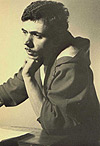
|
KR: "So they helped us paint it. I suppose they were trying to be helpful, really. I suppose I was a little bit resentful about not knowing about this place. We had anger about that, and we'd nick stuff. We'd nick cake - remember that?"
KA: "Yeah."
KR (laughing): "We used to nick the cake! Funny thing was, these were all very posh, middle-class people wearing dungarees and vegetarians and stuff like that, in this vegetarian café. They'd leave these flapjacks out, and we enjoyed them. Pete went for a job one day - what did Pete say?"
KA (laughing, incomprehensible): "Any jobs going? He thought he was in."
KR: "The management of the Arts Centre had me in one day, questioned me about stuff going missing. We used to hang around, annoy them - we said 'We wouldn't abuse the Centre, we like it'..."
KA: "Try some quiche."
KR: "We got a gig at the University across the road, Aston University. The woman who was booking the groups changed her mind at the last minute. We turned up, and she told us The Surprises were playing instead. We had a sit-in. They were going to get the rugby team to evict us... sorry, just talking about it now, it all comes back. Then we needed to raise some money, so we popped down to the University and walked through the classrooms to see if there was anything we could nick. They had these language classes where you get these headphones, with one ear-piece and a speaking thing at the front. We went in and picked up as many as we could, came out with about 30. We took them up to a music shop, 'do you want to buy these headphones'. They've only got one ear in. Anyway."
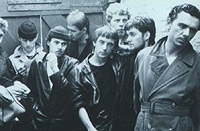
Were you are as alienated from the music scene as you came across as being?
KR: "What do you mean?"
For example, where someone is flicking through a radio station at the start of "Searching For The Young Soul Rebels" and can't find any decent music...
KR: "I personally now feel that I was nasty. I was always doing that sort of thing. There's no need for it really. It's a little sad. On the other hand, we wanted to be important, not be just any old group. We are the next thing, we are the best." |
|
|
I thought that was you echoing punk, saying that this was Year Zero - nothing of any importance happened before this album?
KA: "That was the self-importance, wasn't it? Taking all the different styles of rock - punk, 2 Tone - I thought we just flicked through those. I think we didn't buy those records, we literally flicked through the channels..."
KR: "No, we didn't."
KA: "I'm sure we did."
KR: "No, we added the radio on afterwards. I think we did. I'm sure we did. I could be wrong..."
KA: "It was done when I hard it."
KR: "Done well, wasn't it?"
KA: "Yeah. We actually liked the Sex Pistols."
KR: "Of course. 'Anarchy In The UK' was something else. What a front man Johnny Rotten was. I don't know. For me, it was insecurity, fear that no one would take us seriously."
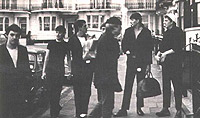
Tribalism is part of youth. Gangs are almost necessary.
KR: "I took it to a dangerous extreme, really. It was to an almost totally self-destructive extreme where we wouldn't talk to anybody and I used to insist on the members of the group not speaking to other groups. You were probably the same Kevin."
KA: "I wasn't keen on speaking to other groups because I felt alienated from them."
KR: "Now, I feel I missed out on an awful lot, because they were my peers - someone I could relate to. And because I didn't mix with them, I ended up alone. That's self-sufficiency was important in the earlier days - but it ended up killing us. It was a strength and a weakness."
KA: "It came over as a bit ignorant. A bit na¥ve, a bit Northern na¥ve."
KR: "Do you think we did?"
KA: "It could be a bit embarrassing if someone in another group came up to you and started talking to you, cos you'd just ignore them or say something that would get rid of them."
KR: "Yeah, I had someone come up to me at 'Top Of The Pops' and say they thought our records were excellent. 'Yeah,' I replied. 'I think yours are fucking shit.' It was awful really."
That sounds fair enough to me.
KR: "It wasn't nice. I'm not proud of it today. It's how we were, can't change it." |

|
With 'Searching For The Young Soul Rebels',
did you set out to make a record that would change the world?
KA: "That's a tall order, isn't it? To be different..."
KR: "Why do you ask that
question?"
Because there's something about that record... there are very few records that stand the test of time, that are such complete entities within themselves and have such a passionate self-belief and doctrine behind them as well.
KR: "When you say that, you sound like you feel that it did in some way change the world."
Yeah, I know people whose worlds it changed.
KR: "I can't deny, especially seeing that documentary, there was something - a doctrine - really extraordinary to that record. It was much more than music and it was very real."
KA: "It was a gang thing. We weren't just a bunch of thugs, we had intelligence and we came through all that. They saw we weren't just yobs or whatever. People saw us as a real group. A lot of people said that to me, which I think is quite a compliment. At the time, groups were manufactured."
That's interesting, because of course plenty of people have called Dexys manufactured over the years - even if you've manufactured it themselves.
KR: "A lot of people think that, don't they?"
But that's what we liked about the Dexys - that you had such a strong identity.
KR: "It complimented it really, didn't it? Always. Right up to all the people laughing at me last year, I think it compliments it. You see, with Dexys and that album last year, there's a suspicion of things that look good - especially among journalists. There's this thing that you're not supposed to look good. Have you encountered that?"
KA: "What?"
KR: "We looked good and because we looked good, people say the image took over. What are you talking about? What's wrong with looking good? It doesn't mean your music isn't any good?"
It wasn't just the image - it was the fact you also had a doctrine and ideas.
KR: "What ideas did we have?"
Any amount in your lyrics... just in the way Jimmy would play his trombone. Just in the way the brass sounds. Even leaving the lyrics aside.
KR: "Right. I was unconscious of that one really. We were totally dedicated, we had nothing at all to lose. That's how we felt. This was the most important thing, there was nothing more important. This came before everything. This was serious. 'Searching For The Young Soul Rebels'...? We did our best, really."
KA: "I wouldn't sit down and listen to it now, I wouldn't do that. I keep going from track to track. I've heard it a thousand times. I don't know what I think about it. That first single... the studio we went into, wasn't a great studio, was it?"
KR: "What are you talking about? 'Geno'?"
KA: "Yeah. It wasn't a great studio. It was small. I remember thinking, if only the company had been more into the potential of it at the time. They knew it would be a Number One."
KR: "And our A&R man tried his hand at producing..."
KA: "They could have put us into a good studio."
KR: "I don't think they had much faith in us in the beginning. We were still on a single deal, weren't we?"
KA: "No!"
KR: "I think we was. They weren't sure whether to do the album or not."
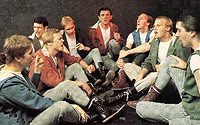
|
|
| Why can't you listen to it now? Because it holds too many memories, or because you can hear all the imperfections?
KR: "I can hear all the imperfections. Maybe that's a defence against the memories - I suppose they are a lot. The break-up, my part in that. It was what we dreamed about, making a great record."
KA: "When we made it, we were feeling quite good."
KR: "We were."
KA: "When we recorded it, everyone was happy, everyone was stable..."
KR: "Stable?"
KA: "I think so. I think so. We'd actually achieved it, and it was coming out, and we already had 'Geno', so we knew it was going to be quite successful."
KR: "I'm glad we recorded it when we did. My feeling at the time was that if we didn't do it quick then we wouldn't get it. If we didn't do it soon... Maybe the group would disintegrate."
KA: "But we had 'Geno'. The company could have put more money into it, they could have asked us where we wanted to record it, but they didn't."
KR: "What, the album?"
KA: "Yeah. It was Pete Wingfield's idea to record it there."
KR: "Good choice, I thought."
KA: "Yeah... but they could have said, 'OK, go to America to record it', because a lot of groups were doing that at the time."
KR: "Were they?"
KA: "I think so. When a group has a Number One record suddenly they're treated like stars... I think so. Not that we wanted to be. But it would have been an interesting thing."
KR: "I'm glad we didn't go to America. It would have been really wrong for us, we couldn't have done it. It would have been too overwhelming. It needed to be insular."
Is that what caused the break-up, when you couldn't be insular any more?
KR: "Probably. It had a lot to do with it, I don't know."
KA: "I think there was a lot of pressure on Kevin to be a superman - being a front man, being a spokesman, looking good..."
KR: "You think I set myself up that?"
KA: "No." |
|
| What did you do straight after the Dexys split?
KA: "Formed the Blue Ox Babes. Have you heard of them?"
No.
KA: "We eventually signed to Go! Discs in 1988. People said it was like Dexys. We had three singles, and the first single got to about Number 91. We did a video and that, and it was played on The Chart Show, something like that. We recorded an album, and they didn't release it at the last moment, and we split up. What were we talking about now? Can we have some more tea?"
KR: "I saw the video recently."
KA: "Did ya? Where did you see it?"
KR: "They had some of if on that documentary thing?'
KA: "Did they?"
KR: "Yeah."
KA: "They said they might."
KR: "It looked good."
KA: "Did it look good?"
KR" Yeah."
KA: "Well, it wasn't a bad video. That was Jeff Baines, he worked for Magnet a lot at the start, did all those Madness videos, just used one camera, really gruelling all day."
KR: "It looked good, with Yasmin (?) dancing."
KA: "She stole it though, didn't she?"
KR: "Yeah, but you all looked great."
Yeah, we were saying about how it was Dexys being less insular which led to the break-up.
KR: "It was that and, you know, just thinking about stuff. There was an awful lot of pressure on me that I couldn't handle. I wish we'd just talked about things."
KA: "Yeah, it got silent. We used to read about other groups not talking - we were well aware of the trappings. It happened to us. We couldn't go to anyone else and talk. You couldn't do that. There was too much at stake."
KR: "Why not? What, pride and all that?"
KA: "Well, it's been called pride... I think a certain amount of it was. I felt I was being left behind. I'd co-written 'Geno', but I felt like I was being left behind. I felt in a different world."
KR: "Because...?"
KA: "We weren't talking."
KR: "because I was getting more media attention?"
KA: "Yeah, but I understood that and I always supported you in that."
Silence.
KR: "Well, what I do when I get under pressure like that unfortunately is go into myself more, and can't communicate with people, talk to people. Yeah, we did lose our insularity. I don't know about you, but when we did get to Number One I was like 'Is this it?' Bit of a let-down."
KA: "We were Number One, everything was going great and I remember Kevin saying to me, 'We're not successful yet'. I thought, 'What's he talking about?' We've achieved so much, only our second single..."
KR: "I couldn't take it on."
KA: "You couldn't take it on? Was it too easy, or what? I felt it felt too easy for you. It probably did."
KR: "I did feel intimidated that you'd written the music for 'Geno' and I hasn't. I felt it was your talents, not mine."
KA: "Yeah, but 'Burn It Down' as well. That paved the way for 'Geno'."
KR: "I've just got this thing where I can't seem to enjoy anything any good. I find it very difficult. I wish I could have just enjoyed it, with hindsight. It just annoyed me, talking about having a Number One single. I think I lost control. It all changed, didn't it?"
KA: "Yeah, it definitely changed. People were consuming a
lot of things at the time - dope and that kind of stuff. That was becoming a
contradiction because we'd been this gang, not trusting the hippie press and
there we were..."
|
|
|
I always loved the way you banned alcohol from your shows.
KA: "Yet we were equally as bad. People who had less importance in the group thought it was OK, but for me it was a big contradiction. So I was like, I've got to get my head together. So I told Kev, I've stopped it now - because Kevin wasn't doing it at the time - and there was no approval."
KR: "No approval from me?"
KA: "I can't remember now."
KR: "But you know, I wasn't the dad of the group."
KA: "No, but you were the leader."
KR: "I was too fucked up myself... so there was no approval anyway."
KA: "Yeah, you know. I felt there was no getting through here..."
KR: "With me?"
KA: "Yeah."
KR: "Did ya?"
KA: "A little bit. I didn't think that 100%, I didn't give up on it."
KR: "What was I like then?"
KA: "You were OK. In quieter moments, you were quite stable."
KR: "What about the rest of the time?"
KA: "When you played up you really played up. Things kicked off. Hitting various people..."
KR: "Really? Band mates?"
KA: "No. You hit that producer. Then there was
that John Moston bloke. And it was getting too real. I thought it was quite
destructive, the way it was going felt like someone was going to get hurt. I
think so."
I don't see how Dexys could have made another album with that line-up. I don't see how it would have been possible to maintain that peak of intensity.
KR: "We burnt too bright, almost.
The feeling was so intense. We couldn't go on. I couldn't go on, not like
that. I remember Kevin coming to me at the end of that tour and saying
that the band wanted to carry on without me - you came to me as a friend,
and told me. First of all it hurt, then I felt quite relieved to be apart
from them. Thank God for that. That's how I felt. I couldn't carry on.
Right now, I can let go of it." |
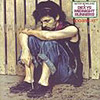
| What did you think of Dexys after you left them?
KA: "I had a thing about 'Too-Rye-Aye' for reasons long gone, not really worth going into, but basically I liked 'Don't Stand Me Down' - I liked that a lot, it's one of the best. Some of 'Too-Rye-Aye', yeah. All that 'Come On Eileen' stuff looked really powerful to me, I knew they were really successful once they've done that."
KR: "I'm OK. Whatever you want to talk about..."
KA: "All right. Basically, I had an idea with a group called the Blue Ox Babes, and Kevin listened to my tape, and their sound got to my sound and the same sound basically ended up on 'Too-Rye-Aye'... I was offered a deal with Stiff records, and we didn't sign because Andy Leek (?) left the group. First we had Helen, and she told me that she didn't really want to join the group. I told her we only wanted her to do bits and pieces, really. She was doing college stuff, so she didn't join us... which was OK, but then she joined Dexys. I did tell Kevin that she's a really good player, and they found her out and she joined..."
KR: "Yeah. You said to me actually that she'd be good for us."
KA: "That was only on the understanding that she didn't want to join our group."
KR: "My plan wasn't to get her... she never did join Dexys. She was only ever a session. She was never signed to the label."
KA: "Because she knew how I worked - a lot. With the fiddles, and that."
KR: "Right. That was already written that when she played on it. Pete Williams said you didn't sign to Stiff because you didn't like the guy."
KA: "I did. He was all right - he was OK, Dave Robinson. So we had some brass, we got Andy Leak in. He was very good musically, when he played the piano he could make that sound - and with Helen, there were two good musicians. The rest were good rhythmically. The bassist didn't work out, so I got Pete in at the last moment. I did a showcase for Stiff - at the Arts Centre, funnily enough. They came up, and basically liked the fact we had Andy - he must have heard them, and he left. I said we could still make a record, but the problem was that I didn't want to deal with all the music and all the image as well, the look... I wanted Andy in it to look after the rest of the group."
KR: "In what way?"
KA: "Musically, and all that. They were quite early starters. On that demo, we practised and practised to get that sound. I was unsure, then he left and I phoned Stiff up and told them it wasn't going to happen. It was a big relief not to sign, and then I heard 'Come On Eileen'... I couldn't believe it! I was in my flat, I heard it and it was Dexys and it sounded like me. I immediately spotted it, and I asked the rest and they denied hearing it. I was quite hurt, you know. I thought, that's me! After that, the time for Blue Ox was a very bad time. My idea was to form a group of characters and it didn't really work. They were too na¥ve, only me and Yasmin lasted till '88 with the Blue Ox Babes. Oh, and the drummer Ian. It was a rough ride for them. I told them we'd be successful, or at least get a record deal. I tried EMI and they didn't want to know. They said it sounded like English folk."
KR: "It was a bit of a subconscious thing at the time, getting influenced. I remember a couple of times thinking we sounded quite a lot like Kevin's - with a couple of fiddle players, and the piano - but there was a bit of a rivalry at the time. You had approached our manager about getting a deal, and I felt a bit threatened by it. I thought it was a competition between us. I couldn't believe when you didn't put a single out. I kept thinking 'Where is it? Where is he?' You'd said to me, don't take it personally if I'm not complimentary about Dexys, because there's going to be some rivalry. Something like that."
KA: "I didn't, did I? I wasn't uncomplimentary."
KR: "No, you didn't do any interviews. But you said something like that."
KA: "Well, I was all set then."
KR: "I thought we was rivals, Kev. That's how I saw it, rivals - to give it its proper setting."
KA: "That's true."
KR: "But it was wrong, the fact you didn't get credited. At the time."
KA: "Financially, it was OK. How could you have credited me?"
KR: "I could have said that this style is strongly influenced by Kevin Archer."
KA: "Once I got used to the idea, saw you on 'Top of The Pops' and that, it wsa Dexys. At the time, my girlfriend Yasmin thought I was mad. If it was my sound, why didn't I do anything?"
KR: "Why?"
KA: "I'd promised her quite a lot and I was letting her down. That was a problem really. One I got used to it, I thought it looked great on Dexys and it lasted as well. It was far bigger than 'Geno', which was only Number One in the UK. 'Eileen' was Number One in the States, other places. Everywhere I went it was on the radio. Everywhere I went. I remember I went to Cornwall to get away from it and went into a café, and it was the first song on." |
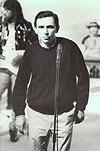
| It wasn't really something you could escape.
KA: "It was a great song though. A classic."
KR: "It was a good song. I've got to tell you that. I was beating myself up for years over that, because of my drug use - I'm a complete piece of shit, I've never done anything good, it was Kevin all the time. I'm fucking useless. Until I stopped taking drugs, I was like that. When I signed to Creation, that's why I put that statement out saying 'I'm fucking useless by the way Alan McGee and anyone else'. And it was only when the press picked it up wrong, like The Daily Mail said I stole my friend's song, I thought... hold on a minute, I fucking wrote that song."
Did the success of "Come On Eileen" become a millstone?
KR: "Yeah. A massive millstone. It was bigger than the group. 'Geno' had done that to us, but this was far bigger."
I lived in America for a while - it's the only way they know who Dexys are.
KR: "Sad that, isn't it? Sad for us. I was forever getting people coming up to me, and I did get fed up with it, saying 'you did a song that really meant a lot to me' - and it would be 'Come On Eileen'. It was like the only song we'd ever done. But, you know what, it's changed over the years. I can't remember when it happened, maybe five years ago. People started saying it was 'This Is What She's Like' or 'Knowledge Of Beauty'and as time has gone on, it's got to mean more, Dexys. 'Come On Eileen' is now somewhere over there. Seeing that documentary I do see now some of the power that Dexys had - which I'd forgotten really."
KA: "It's easy to forget, when you just got the record. That's all we got now."
KR: "That's all we got, and that's not enough. It's a powerful thing, wasn't it?"
KA: "All the live shows, and all the changes, because there were about four of five changes."
KR: "What do you mean, changes? Different groups?"
KA: "Different groups. Clothes, and that lot." |
|
| Was "Don't Stand Me Down" consciously contrary?
KR: "Contrary? Awkward? Er... no. It was exactly how I felt. I thought I'd put down whatever I felt, it was going in there. I think I was completely disillusioned after 'Too-Rye-Aye' and that world tour. The success of it felt shit. It was a completely empty experience."
What were you disillusioned with?
KR: "The group was shit, to be honest. It was full of session players who weren't into it. The shows were rubbish. I probably flipped a bit - like on our first European tour. I lost the power somehow, like the first time we got successful. I was permanently stressed out. I'd be on a stage a permanent nervous wreck. I couldn't relax and couldn't enjoy it. People coming up to me on the street started really getting to me. I was pretty paranoid in the first place, and this really didn't help. I didn't respond well to that, I wasn't very comfortable with it, felt like I was in a goldfish ball. The money didn't mean fuck all. I thought I'd get myself a lovely flat in Birmingham with these lovely carpets and all that... rubbish! It just made me feel more miserable. Went to New York, bought a load of clothes, went back to the hotel, thought I'd feel better with all of these clothes... got back and I had paper bags everywhere in my room. It was a mess, and I just felt very depressed."
Pause.
KR: "Oh, and I knew I was being ripped off, I knew the money was being stolen because there was no accounts being shown, no one said anything about money. I was given access to a bank account, I never saw any statements or accounts - I've never seen any to this day. I knew that the manager and accountant had access. It was never mentioned. There was an atmosphere around us when we were successful and going round the world. And I just went along with it. I didn't have the courage to ask anyone about the money. I was on my own. Again, I'd gone insular. I didn't talk to anybody and I just felt I've got to keep this going on my own. There's all these people working... Isn't it great we're successful? I shouldn't complain. But inside I was dying. All I had left was my music... all I had left."
Pause. |
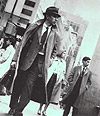
| KR: "And there was a part of me with 'Don't Stand Me Down' - this is why I didn't want to release a single - I wanted to say to the manager and the accountant, fuck you, the gravy train stops here. That was it. Just as 'Don't Stand Me Down' came out I was told the good news is you've got 40 grand left in the bank. I found out later that over a million had come through. I bought that flat in Birmingham for 37 grand, I bought a car for six. I couldn't have spent more than 80, 90 thousand tops. Anyway, the 40 grand was the good news. The bad news was that I had a tax bill for 80 grand. And that was it. Skint. Anyway, there it was. Gone."
It's strange because your public persona is pretty much the opposite of the insecure, paranoid portrait of a person you've just painted.
KR: "I know. It is, isn't it? But you see, I was OK on the way up when I had something to fight for, but when I got to those situations of anything like success I didn't know what to do."
That's the problem with success - people want it, but often haven't figured out why.
KR: "I think I wanted to be successful because I felt like shit and I thought that when I got there I'd feel better. Well I didn't. I felt worse - and all my insecurities magnified. Success brings out what sort of person you are. Did you find that Kevin?"
KA: "Yeah, I did. And you can't just solve it quickly. You need help with it."
KR: "It's a massive strain." |
|
| How do you cope with the after-effects of fame: the downside?
KR: "Drugs, and I wouldn't recommend that. In other words, I didn't cope with it. I couldn't cope with it, too much mate, too painful. I couldn't allow myself to feel that. It was all I had! So I took drugs with other people, fuck that - that's a load of fucking shit anyway."
KA: "I can recommend is to leave the country. That's the best thing. I found when I was in Germany, I could wake up and go for a walk and there was nothing - not a record shop, nothing connected with Dexys. That was the only time..."
KR: "What about when you met other people? Did you tell them you were in Dexys?"
KA: "I did. When people ask what you do, you tell them."
KR: "But I don't want to say I was in this group in the Eighties. What, 'Come On Eileen'?"
KA: "People wanted to know how I survived and that. How I get money. So I told them."
KR: "Sometimes friends want to know why I don't tell people - like, aren't I proud of Dexys? Well, I am, but I don't want to keep looking for a fucking start. People pull you back, they think you must be longing for these golden days. I'm happy being me now, thank you very much. I think this album's pretty good, and I'm enjoying talking about it but there's painful stuff as well. I wouldn't want to be stuck in the fucking past."
While I'm out the room, the pair talk about how they used to write everything down during interviews, so they didn't forget anything they needed to say - KR contrasting this with his new-found easiness of manner where he just says whatever comes into his head. KA compliments me on my line of "not direct" questioning. |
|
| KR: "Going back to the fame thing, I remember in 1982 - at the height of Dexys fame - being in the same restaurant as Boy George, just when Culture Club were at a similar height of fame. I was always a stickler for Dexys wearing the clothes that we wore all the time as if we lived it. But with success, I soon had to change it, because I couldn't walk down the road if I wore dungarees, I couldn't walk down the fucking road... but here was George, with his great big hat Boy George, standing outside signing autographs in his element, really enjoying it. He was the exact opposite to me. I was just sidling out, trying to get out. I felt like I was under siege. Some people, it infuses them, makes them grow. It has the opposite effect on me."
You can't have a gang unless you have something to kick against. If you're on top, you're no longer kicking against anything.
KR: "Yes, that's true. It was a problem for me. What you do in that situation is just enjoy the success."
What were the high spots of "Searching For The Young Soul Rebels", being in Dexys around that time?
KA: "'Geno', obviously. No, actually, I have to say for me 'Burn It Down'."
KR: "Do ya?"
KA: "Yeah, I've always liked that from the first time Kevin played it to me. The highlight for me was doing 'Top Of The Pops' with 'Burn It Down', singing those backing lyrics... personally, for me, that was less plastic-y than 'Geno'. It was more genuine."
I thought so myself, but only cos I was so elitist.
KA: "I think that was a big achievement because it came from nowhere..."
KR: "What? 'Geno'?"
KA: "No. 'Burn it Down'. It came from nowhere."
KR: "That defined the style for the first Dexys."
KA: "It was good, doing 'Top Of The Pops' like that - everyone would come up to me, and say they saw me. It got to Number 38, then of course it was 'Geno'."
KR: 'Geno' going up the charts for me was good, when it got to Number 12 and we did 'Top Of The Pops' and we started getting more confident... but after that, it all went downhill for me. I was out of my depth and worse than that I was pretending not to be out of my depth. If I'd known it was freaking me out... but we kept driving on, going down, and I snapped. You know what was good for me? Before 'Searching For The Young Soul Rebels', was the 'Straight To Your Heart' tour playing all those universities and all things like that. Going in there and people hardly knew us, but by the end of the evening we'd won them over."
Reminisce about robbing a hotel in Belfast.
KR: "I always felt good when I was robbing something... and then we just wandered down the street leisurely and played the gig. We did a good show that night." |

| What do you think it was about Dexys Midnight Runners that makes people feel they're so special, even now?
KR: "The music, plus what we talked about earlier... you know what he called it in that documentary? Proletarian ethos. I think that's what it was - that realness. We were a people's group in a way. We were for the people, weren't we?"
Very much so, and the fact you didn't like the media only increased the people's affection for you.
KR: "People dislike the media even more now. They've got wise to it, after 20 years. That was part of it. And it was so fucking real. When I see that video now, old photographers of us, when I see how we were. God we were serious, God we meant it. There was no fucking around with us. We may have been the most real group around, because..."
Voice trails over.
KR: "It was very pure. I think now... oh, I don't know. I think we were very real."
KA: "When I was in the group, when people came up to me they weren't resentful or anything like that. They liked us cos we were a real group, and I was quite proud of that."
KR: "What did they mean by a real group."
KA: "Like we weren't manufactured or anything like that."
KR: "But people say it was manufactured - manufactured by me and you. That's what they say."
Perhaps the most real groups are the ones manufactured by their own members.
KR: "Yeah."
KA: "It was manufactured in a sense that we knew what people we wanted in the group, what types. We sifted through thousands of people to find the right ones."
KR: "We had good ideas and got the right people in. There's nothing wrong with that. It was very rich, wasn't it?"
Honest. That song about love on "Soul Rebels" - it was the first time I'd ever heard anybody talk about love in the same way as I felt.
KA: "But didn't you find it weird when you first heard it? I thought, what is this? Because I had a girlfriend at the time and I liked to think I loved her - as it turned out, I didn't. Then when I heard that, I was like... hang on, he's done it again!"
KR: "He's done what again?"
KA: "He's writing about stuff - cos he did it with 'There There My Dear', the lyrics to that..."
KR: "What about them?"
KA: "Well, they were controversial, weren't they? Lots of people aspire to be into those people, some of them were mentioned in the music press."
That song still totally sums up a whole breed of people today.
KR: "I'm not proud of it now, to be honest."
KA: "You're not?"
KR: "No, because I don't feel that way now. I went to an art exhibition recently, and the guy had a quote of mine from that song there - 'The only way to change things is to shoot men who arrange things'. I wouldn't agree with shooting people at all. I was just anti-love. I feel differently now. But, you know. It's OK. That's how it was then, and it's good."
Obviously if you put yourself on the line, then you're setting yourself up for a fall later. That's not what's important. What's important is that you're putting yourself on the line at that moment in time.
KR: "I know. And we did. I'm not embarrassed by it. I disagree with it. Some journalists I met last year want to kind of eulogise Dexys behaviour that I know now was fucking peer-driven defensiveness and I won't do that now. I don't want that job, I don't want to fight other people's battles - it's 20 years ago, I'm not there any more. I've fucking moved on, and it would be a fucking sad thing if I hadn't." |
|
| KR: "I want to ask you a question. You know you said you can think of only a few albums that have been so succinct and as complete as that, which ones? An entity."
Huggy Bear. A couple of Nina Simone albums. Obvious soul albums like Marvin Gaye... "Searching For The Young Soul Rebels", apart from one track, I couldn't take it off. It wouldn't be right.
KA: "Which track don't you like?"
KR: "Which track?"
I can never remember titles. The one where you sing high up and very fast.
KR: "Yorkie! - 'Thankfully Living In Yorkshire It Doesn't Apply'. You don't like that?"
I like it fine, but not as much as the others.
KR: "Which is your favourite Dexys album?"
For about 10 years I always said "Don't Stand Me Down" but just in the last six months I've changed my mind and I think it's "Searching For The Young Soul Rebels" again probably because I go through periods of really listening to one, then another. |










